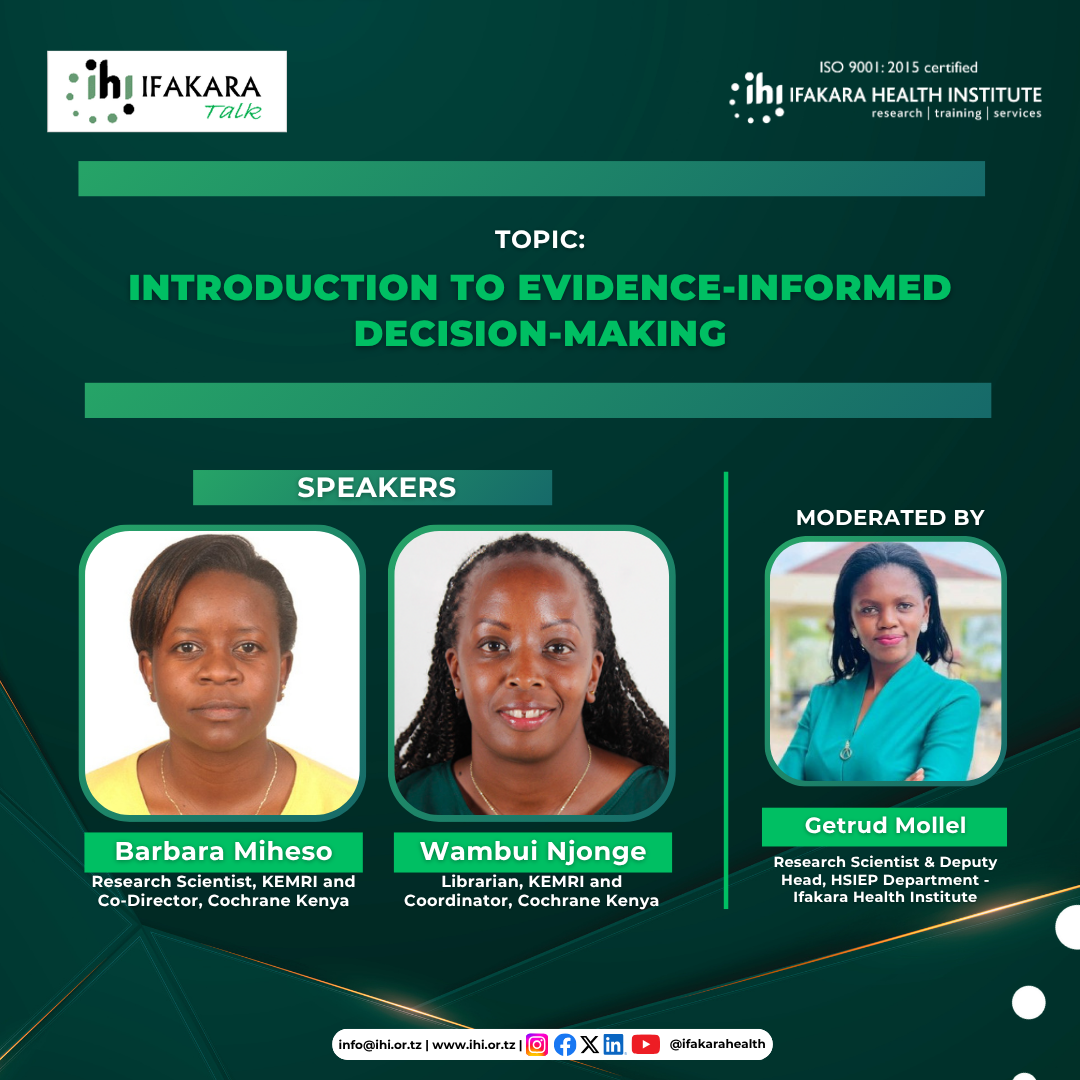
WEBINAR: Ifakara hosts first evidence-informed decision-making talk with KEMRI/Cochrane Kenya

On August 6, 2025, the Ifakara Health Institute’s Health Systems, Interventions, Impact Evaluation & Policy (HSIEP) Department hosted its first webinar on evidence-informed decision making (EIDM), featuring experts from the Kenya Medical Research Institute (KEMRI) and Cochrane Kenya.
The event, moderated by Dr. Getrud Mollel, Deputy Head of HSIEP, brought together researchers from Ifakara. Presentations by Barbara Miheso, Research Scientist at KEMRI and Co-Director of Cochrane Kenya, and Wambui Njonge, Librarian at KEMRI and Coordinator at Cochrane Kenya, covered key topics including evidence-informed decision making, evidence ecosystem, the importance of relationships between researchers and policymakers, and practical tools for gathering reliable evidence.
Starting the Conversation on Using Evidence
Dr. Mollel explained that researchers work hard to generate robust evidence with the hope it will inform policy, but the reality is that decision-making is not done by researchers alone, and it is influenced by many factors-including evidence itself.
The challenge for institutions like Ifakara, she explained, is ensuring that robust evidence, both from their own research and from other credible sources, is used effectively to influence decisions and improve health outcomes. This is especially important in a time when global health funding is increasingly unpredictable and scientific findings must align with real-world contexts and community needs.
The big question it’s addressing
How can evidence be translated into policy action to improve health outcomes?
Objectives and goals of the learning series
Dr. Grace Mhalu, Head of the HSIEP Department, welcomed participants and emphasized that this webinar is just the beginning of an ongoing effort. She outlined three strategic goals of the initiative: strengthening the bridge between research and policy, producing evidence that is both relevant and usable, and empowering researchers and policymakers to ask the right questions and deliver actionable answers.
What makes evidence-informed decision-making work?
Barbara Miheso, Research Scientist at KEMRI and Co-Director of Cochrane Kenya, explained that policy is shaped not only by evidence but also by political interests, institutional context, and timing, among many other factors. She stressed that relationships and trust between researchers and policymakers are as important as the evidence itself.
She outlined three foundational pillars for EIDM: rigorous and high-quality research evidence, practitioner and clinical expertise, and community or patient values and preferences. Evidence must be gathered conscientiously, shared explicitly, and assessed rigorously for quality and relevance to have meaningful impact.
Practical tools for finding better evidence
Building on this, Wambui Njonge, Librarian at KEMRI and Coordinator at Cochrane Kenya, introduced the fundamentals of systematic literature review. She explained how systematic searching involves clear planning, use of multiple databases, and tools like PICO and Boolean logic. Wambui highlighted the importance of plain language summaries in the Cochrane Library, which distill complex research into accessible narratives free from jargon, making evidence understandable to policymakers, practitioners, patients, and the public.
Conclusions and recommendations
In closing, Dr. Honorati Masanja, Executive Director of the Ifakara Health Institute, reflected on the importance of relevance when considering research impact: “There’s a lot of evidence coming out, but is it really relevant to inform policy?” He thanked the presenters for their valuable insights and emphasized that producing evidence is only half the puzzle—ensuring it is used effectively is where real impact begins.
